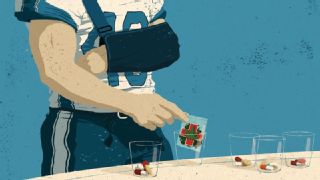|

THE TRUEST WAY to see the NFL is not before the game, when the helmets are shiny and the energy is high, but after the final whistle, when the bodies are bruised and the athletic tape is soiled with dirt and blood. Or at the practice facility the following day, when the players show up with crutches and walking casts, fingers in splints, arms in slings. Pain is the singular constant of the NFL. Maintenance of that pain is as vital to players as mastering the read-option; whether through cortisone, painkillers or drugs and alcohol, they have always self-medicated to heal from the game that breaks their bodies. Which is why, more than any other sport, the NFL should lead the conversation on considering medicinal marijuana as a therapeutic alternative. Medicinal marijuana is currently legal in 20 states, eight of which are home to NFL teams, and it is almost universally accepted in the medical community as a safe and effective pain reliever. Yet there appears to be no plan to reassess marijuana's place on the NFL's list of banned substances, and according to the NFLPA, no player in the league has received an exemption to use pot for medicinal purposes. That likely won't change tomorrow or even next year; the transition toward legitimacy is tricky. States are decriminalizing marijuana even as it remains illegal federally. Where marijuana can be obtained with a license, it still violates numerous federal drug-free-zone school statutes. If you're caught boarding a plane with marijuana or putting it in the mail, you will likely face arrest, whether you have a license exemption or not. Decriminalization is one thing; mainstream acceptance is something else. In a recent Gallup poll, for the first time, a majority of Americans (58 percent) said that the drug should be legal. Still, as much as the awareness of marijuana's medicinal benefits is growing, the racial and cultural stigmas attached to it are far stronger, at least for now. (Remember Charles Oakley once saying that the NBA had "guys out there playing high every night," or the ridicule snowboarding takes for being a "stoner sport.") So marijuana appears destined to join Sudafed in the gray area of sport: a legal substance that athletes are banned from using. It doesn't have to be this way. The NFL has been defined this season by its unwilling place at the front of cultural transitions in sports. Its ironclad codes of masculinity are being challenged, first through grudging acknowledgment of the vulnerabilities of the human body, and second, from a re-examination -- again unwillingly -- of the locker room environment, as ignited by Richie Incognito and Jonathan Martin. But now the league has an opportunity to actually lead, to open a discussion about medicinal marijuana and about the culture of pain maintenance among its players. No one can pretend this is an easy conversation to have, with the inevitable discomfort that comes from recognizing America's utterly failed war on drugs. And the path of least resistance would be for the league, with its corporate caution, to back away and wait until the states and the federal government can reconcile local decriminalization with federal statutes, to find a dozen easy and obvious ways to stifle discussion. But what was illegal yesterday may be legal tomorrow. And because football players deal with pain management more acutely than athletes from other sports, a more virtuous and forward-thinking approach for the NFL would be to stimulate discussion of marijuana use. This is a league in which the locker room culture still demands that athletes play through it all. And given that marijuana is a legitimate pain reliever -- especially for the migraines that can be a byproduct of head trauma -- and is far less dangerous and potentially addictive than, say, OxyContin, it is almost immoral to deny players the right to use it. Whether it is the military or construction work or playing left tackle, pain -- and not politics or culture -- is the real issue. And if the NFL is serious about making the game both safer and better to play, it should be a leader on a difficult topic, to contribute to an honest dialogue and, more important, to make life a little more comfortable for its broken warriors. Follow The Mag on Twitter (@ESPNmag) and like us on Facebook.
|

